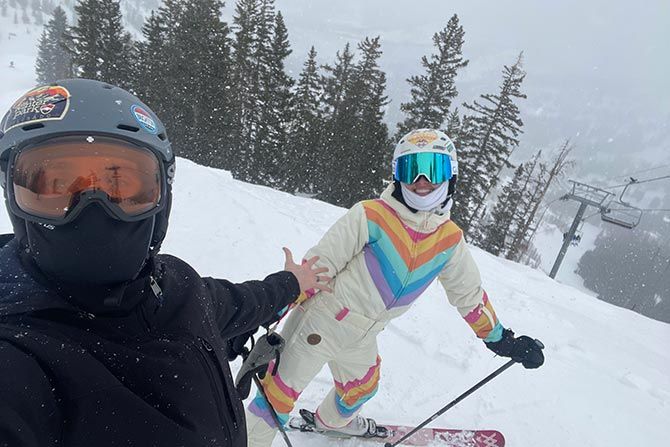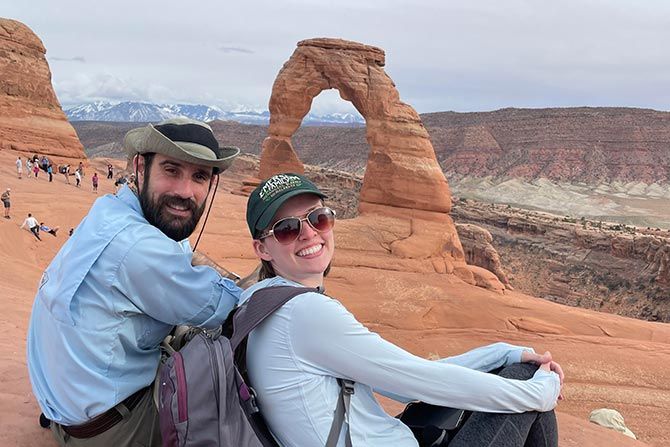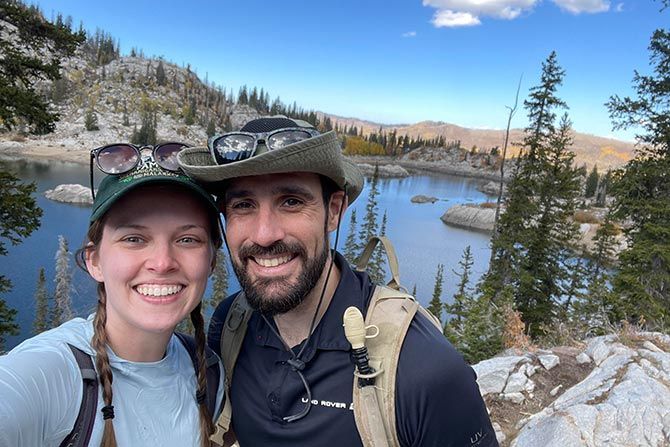First, a Bit About Julia and Dave
Julia: I was born and raised in eastern Tennessee, and then went to college in the mountains of South Carolina. I definitely had that desire to combine being away from home but wanted an easy/short drive back. I moved even farther when I went to medical school at the Medical University of South Carolina at the beach in Charleston. I had a sister who was finishing her last year of radiology residency there, as well as several college friends in the area — again, kind of staying in that comfort zone of the familiar.
Growing up in the eastern mountains, I had a huge love for the outdoors. My summers were full of camps, backpacking trips, hiking with family, etc. It was definitely something I missed when living at the beach, and I couldn’t wait to get back to the mountains for residency.
Dave: I grew up in Pennsylvania about 20 minutes outside of Philadelphia. None of my family was in medicine; most of them are interested in theatre and art. I used to swim and run cross country when I was in high school, and I was a so-so student. I enlisted in the Army out of high school, and I served in Afghanistan from 2009–2010. After I came home, I went back to school at Temple University in Philadelphia where I majored in Psychology and Neuroscience. I’m pretty jealous of my spare time, but I don’t really spend it all that productively. I play video games and hike, and I like to pretend that I run sometimes.
The Journey to Medical School and Family Medicine
Julia: So, my family is full of doctors — mom, a pathologist; dad, a radiologist; older sister, also a radiologist; and cousin and grandfather in internal medicine. It was always an obvious option, so obvious that, for a while, I actually intentionally ignored it because I didn’t want to fall into that trap of the “family business.” But I was immediately drawn towards science, particularly chemistry, through high school and actually picked my college, Furman University, because of their superb chemistry program. But I ultimately realized I couldn’t see myself as a PhD, writing grants my whole life.
A roommate of mine in college introduced me to plant-based diets and I started a huge investigation into what I now recognize as lifestyle medicine. It was this focus on nutrition and the benefits it could have for patients that finally drove me back toward medicine. I planned on taking a gap year after college and knew going into medical school that I wanted to be a primary care physician. At that point, I’m not sure I knew what family medicine was, but every time I described what kind of doctor I wanted to be, every advisor told me I should look into family medicine. I immediately joined the MUSC family medicine interest group, and the more I learned, the more it was the obvious choice for me.
Dave: Originally, I went to medical school at the Medical University of South Carolina (MUSC) on an MD/PhD scholarship. I was really interested in research when I was an undergraduate. I was accepted into the program at MUSC at the beginning of my senior year in college and had every intention of studying for a PhD in neuroscience, specializing in neurology and just doing animal research for the rest of my career. But around the end of my senior year as an undergraduate, I started to become interested in public health, preventative health and healthcare systems. When I got to MUSC, I tried to start my PhD in public health, but after one year, I decided to leave the PhD program and go back to medical school. I decided that I was more interested in practicing medicine than research. I ended up getting really lucky and I had family medicine early in my third-year rotations. At MUSC, family medicine is a rural rotation, and I stayed in Chester, South Carolina, for a month with an awesome family medicine doctor who inspired me to go into FM. Working with him really gave me the confidence for the rest of medical school, and by the time applications came around, I knew exactly what I wanted to do in terms of specialty.
Continuing Their Journey as a Couple
Julia: Dave and I started in the same class in medical school. We were friends for over a year before we started dating. He was enrolled in the MD/PhD program, with an interest in epidemiology. So initially, I realized we were going to have very different looking career paths.
Dave had a famously big bushy black beard during medical school. One day out of nowhere, he completely shaved it. I was so taken aback I had to talk with him after class one day. We continued that conversation in messages, and long story short … we’re married now. He still loves to shave his beard to surprise/scare people.
Dave entered his first year of research as I went into clinicals in my third year of medical school, but he realized quickly how much he missed interacting with patients. He left the PhD program after completing that year, and I think that realization greatly influenced his desire to become a family medicine doctor.
Dave: We started out in the same class. I had taken a test that the AAMC puts out that tells you what specialties in medicine you might be interested in, and family medicine was one of them, so I joined the family medicine interest group (FMIG). I think maybe some of the first times we talked, it was in the FMIG. But the truth is we were friends before we started dating. About halfway through second year, we started dating, and then I left at the end of second year for a year of research with the PhD program. I knew pretty quickly that I didn’t want to stay in research, so I left. It did mean that Julia was now a year ahead of me, so we had to figure out a creative solution to that.
The Process of Matching as a Couple
Julia: Since Dave and I were separated by a year, that got tricky. I considered several different “solutions” to see if we could eventually couples match together. I considered an MPH, a research year, but ultimately decided to pursue a Transitional Year Residency and was lucky to match nearby in Myrtle Beach, SC. Dave proposed just a few weeks before my first Match Day (I happy cried). It was a big priority for us to match in the same location, and I’m so glad I took that extra year. Dave is my best friend and my biggest support. Being in the same residency has been an amazing experience. Our faculty and co-residents are really supportive.
I developed a strong interest in OB while in medical school, so knew I wanted that to be a strong component of my residency. That alone increased our desire to move out West, where programs felt more well-rounded and full-spectrum. At this point in my life, I was also ready for a bigger change, and my family had been traveling out West for vacation for years; it felt like the place I wanted to establish my career. What better time to move than in training? We looked broadly across the entire Mountain West and Pacific Northwest.
Utah Valley was initially just an appealing curriculum on a website. Easily checked the boxes we were looking for. It ironically was the only interview we did where we both interviewed the same day (all virtual for us). The residency felt so unique, everyone seemed so happy, and the curriculum stood out, even after interview season, as the best fit for us. Neither of us had any family in Utah, and neither of us had ever set foot in Provo, but we were ready for adventure!
Dave: Matching as a couple is a lot like matching by yourself, but with an extra layer of complexity. Instead of just ranking your own preferences, you are ranking iterations of preferences. So, you end up with rank lists that are like 100 points long. I think at one point, I calculated that if we wanted to rank everywhere that we interviewed in every possible combination, we’d have something like 350 ranks. That cost extra money, so we decided not to do that. In some ways, we had an advantage because we were both looking at family medicine. I think where it really starts to get tough is when you’re trying to match in two different specialties. It took some negotiations together to decide stuff like, do we want to be in the same program, or different? Academic, or community? Location? Etc. When we were early in fourth year, we decided to attend AAFP’s National Conference in Kansas City. It was virtual that year, but it was an opportunity to explore programs across the country. I don’t think we talked to Utah Valley at the time, but we talked to someone at the University of Utah, and his passion for Utah really inspired us to start looking at programs out here. When we interviewed, we both just loved everything about the program: the atmosphere, the faculty, the co-residents. It was a no-brainer. And we’ve loved it here so far. We live about five minutes from work, the skiing has been awesome, the hiking, the parks, just everything.
Their Hopes for the Future
Julia: Dave is hoping to pursue a career as a hospitalist, and I would like to work primarily in the clinic/outpatient setting with a strong focus in OB. I’m planning to apply to family medicine OB fellowships this summer. We really want to prioritize staying the mountain west and see ourselves settling in Utah or Colorado. I’m also interested in teaching and could even see myself joining a residency as faculty if I’m lucky enough to get the opportunity!
Dave: That’s tough to say right now. I’m interested in careers with a more inpatient focus. We’d love to stay around here, but we’re having to negotiate a few factors, not least of which is how few OB fellowships there are. I suppose, in terms of where we see ourselves in practice, I think we could make a really good team for a community, eventually. Julia practicing outpatient and OB, while I practice more inpatient.
If you could go back in time and give yourself some advice either as a medical student or new intern, what would you tell your younger self? Do you have any advice for those looking at pursuing a couple’s match?
Julia: Talk to other couples when you match. It always helps to hear from those who’ve been through it. Make sure you pick the program that works for you, not just your partner. It’s OK to support each other as individuals as well as a couple.
I would tell my younger self to get excited. It’s more fun and more rewarding than I could have imagined. And going through it with your best friend is even better.
Dave: I guess the only advice I’d give myself is to just keep my head down, keep studying and moving forward. It’s a marathon from undergraduate through residency, and there’s really nothing you can, or should, do to speed it up.









